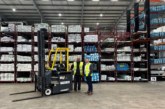
Written ahead of the final conclusion of the Brexit negotiations in December, PBM Editor Paul Davies used his Viewpoint column in the magazine’s January edition to discuss the impact of the supply chain issues on the market.
Warmest New Year wishes to all PBM readers, and here’s hoping that 2021 will be a brighter year than the twelve months just passed.
Writing this in the run up to Christmas, please forgive me the slight lack of seasonal good cheer. By the time you read this the UK will have finally, formally left the European Union with the transition period now concluded, yet the Brexit machinations will endure as the nature of our future trading partnership with the EU (and indeed, the rest of the world) develops. It has been a painful process to get to this stage, and short term disruption at least is now an accepted certainty on all sides of the debate.
Indeed, the conclusion of such a fraught period of negotiation has to come as some relief, though the nation now has to manage its new future with the shadow of COVID-19 still looming large. The promised ‘sunlit uplands’ of Brexit may yet follow, but a triple whammy of the EU departure, the ongoing pandemic and seasonal demand are causing serious problems in the supply chain right now.
The degree of where to apportion ‘blame’ will of course vary depending on your perspective, however increasing numbers of suppliers and representative bodies such as the BMF and the Timber Trade Federation are urging the supply chain to work together to ensure that logistical issues at the ports can be mitigated.
For example, quoting both BMF CEO John Newcomb and TIMco’s Simon Midwood, an article in The Guardian in early December reported: “The UK’s ports have been grappling with a surge in freight volumes at a time when their ability to process it all is hindered by coronavirus restrictions.”
With Christmas demand compounding the issue, the piece continued: “Since September, the country’s biggest container port, Felixstowe, has been handling about 30% more goods than usual, with businesses rushing to replenish stock after the end of lockdowns and building stockpiles before the end of the Brexit transition period.”
In the article, John described the situation as becoming a “major issue” for the sector, with delays of up to four weeks for certain products to be cleared. Simon Midwood, MD of TIMco, also noted that the firm’s shipping costs had increased by more than 300%, pushing up cost prices by between 3% and 17%.
Meanwhile, the Timber Trade Federation (see page 8) has advised its members to implement plans with their suppliers as a matter of urgency, expressing concern that “companies without a longer-term purchasing strategy will struggle to replenish stocks through just-in-time buying in Q1 and Q2, 2021.”
So whilst the construction industry has performed impressively following the seismic shock of last spring, it remains a fragile recovery. That Brexit is finally ‘done’ in one sense offers much needed certainty, and the vaccine rollout offers tantalising hope that a return to more normal times is on its way.
However, the close co-operation and clear communication throughout the supply chain — as forged during the first phase of the pandemic — will continue to be vital as the United Kingdom takes its formative steps along a new path.
“Close co-operation and clear communication throughout the supply chain — as forged during the first phase of the pandemic — will continue to be vital as the UK takes its formative steps along a new path.”









